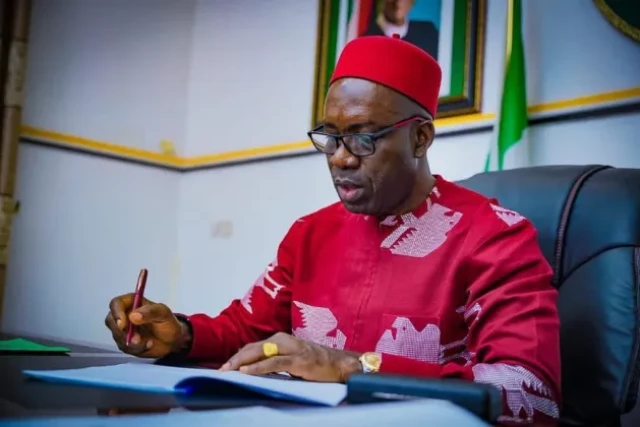There are growing concerns in Anambra State that the recent Supreme Court judgment affirming local government autonomy may be undermined by a new bill introduced by Governor Charles Soludo.
This bill aims to compel local government areas (LGAs) to deposit a portion of their federal allocations into a consolidated account controlled by the state.
Hon. Henry Mbachu, representing the Awka South I State Constituency (Labour Party), warned on Tuesday that the proposed legislation submitted to the Anambra State House of Assembly should be withdrawn.
He contended that it would enable the state government to access funds intended for local councils, compromising their financial independence.
Governor Soludo argued that the bill did not breach the Supreme Court's ruling regarding local government autonomy, challenging anyone who disagreed with him to seek legal recourse.
Mr. Emma Madu, Secretary to the Speaker of the Anambra State House of Assembly, confirmed that on Tuesday, the Assembly passed the bill titled, 'the Anambra Local Government Administration Law 2024.'
The bill requires the establishment of a "State Joint Local Government Account" into which all federal allocations to local government areas must be deposited, as per Section 13 (1).
Section 14 (3) further requires each LGA to remit a state-determined percentage of their allocations to the consolidated account within two working days of receipt, even if those allocations are sent directly from the Federation Account.
Section 14 (4) states that if the state receives an LGA’s allocation on their behalf, it must deduct the designated percentage before transferring the remaining funds to the LGA.
In response, Mbachu expressed deep concerns about the bill’s potential harm to local government administration, warning that the proposed deductions would severely limit LGAs’ ability to independently manage their federally allocated funds.
He called on President Bola Ahmed Tinubu to monitor governors who might jeopardise progress in local government elections by pressuring elected chairpersons to redirect funds to the state.
Mbachu cited the Supreme Court’s recent judgment granting financial autonomy to LGAs as a crucial advancement.
He asserted that the executive bill threatened this progress and could hinder efforts to facilitate mandatory local government elections in the state.
Members of the Labour Party caucus in the Anambra State House of Assembly have also distanced themselves from the bill.
The lawmakers, Hon. Jude Umennajiego (Onitsha South 2), Hon. Patrick Okafor (Onitsha North 2), Hon. Mazi Paul Oby (Orumba North), Hon. Nkechi Ogbuefi (Anaocha 1), Hon. Fredrick Ezenwa (Onitsha North 2), Hon. Kingsley Udemezue (Idemili North), Hon. Justice Azuka (Onitsha North 1), and Mbachu spoke through their leader, Umennajiego, emphasising their commitment to upholding the constitution and the Supreme Court decision.
“We unequivocally stand with the overwhelming majority of Anambra residents in upholding the constitution and the Supreme Court ruling,” Umennajiego stated.
In response to the opposition, Anambra State Commissioner for Information, Dr. Law Mefor, defended Governor Soludo, asserting that the House of Assembly acted within its legal authority.
“Is it the Supreme Court that should confer power or the Constitution? Does the Supreme Court make laws?” Mefor questioned, arguing that the court’s judgment only serves as an interpretation of the constitution, which does not supersede it.
He pointed out that Section 7 of the 1999 Constitution empowers State Houses of Assembly to enact laws governing the administration and financial regulations of LGAs.
Mefor stressed that the bill aligned with the Assembly’s constitutional mandate, urging opponents to challenge it in court.
“The Supreme Court’s judgment does not, in any way, modify the constitution. No one is saying that local governments will not maintain autonomy,” Mefor added.
Political analysts have noted that if Governor Soludo succeeded with the bill, it might set a precedent for other state governors to undermine local government autonomy while superficially adhering to the Supreme Court ruling.




















